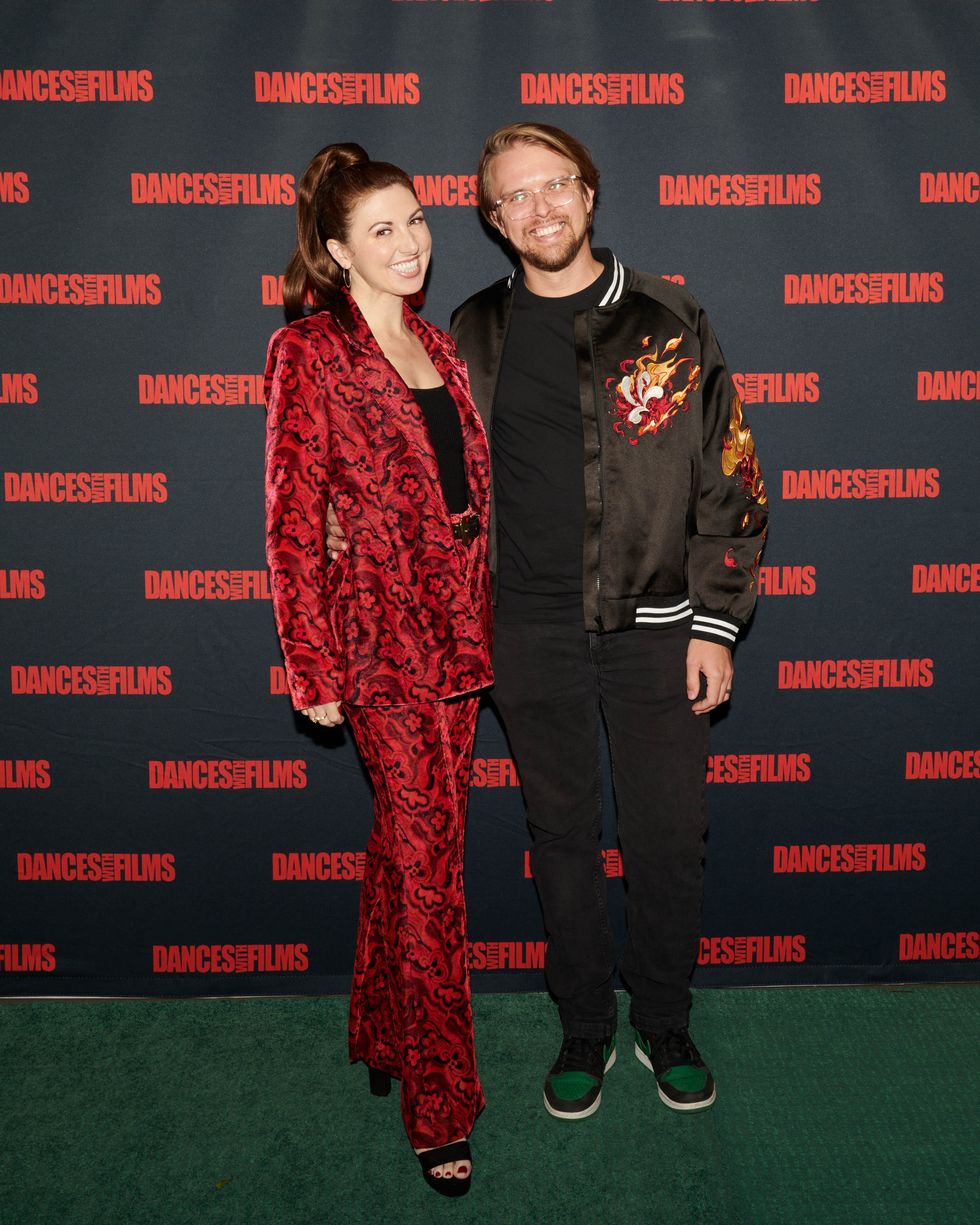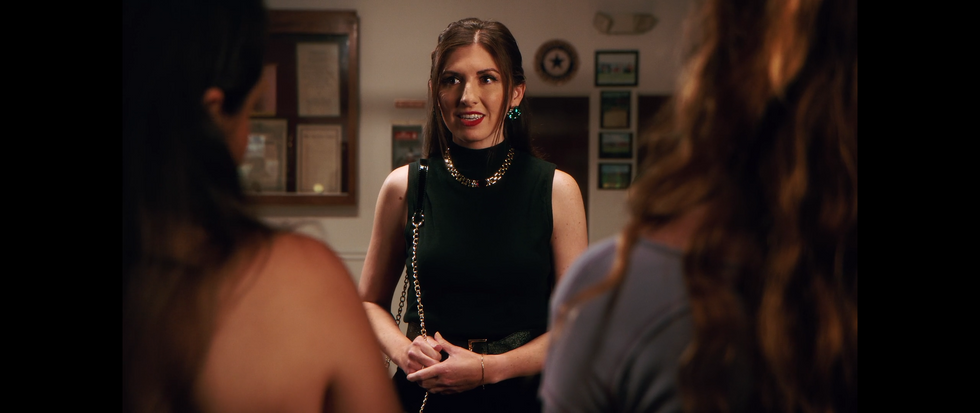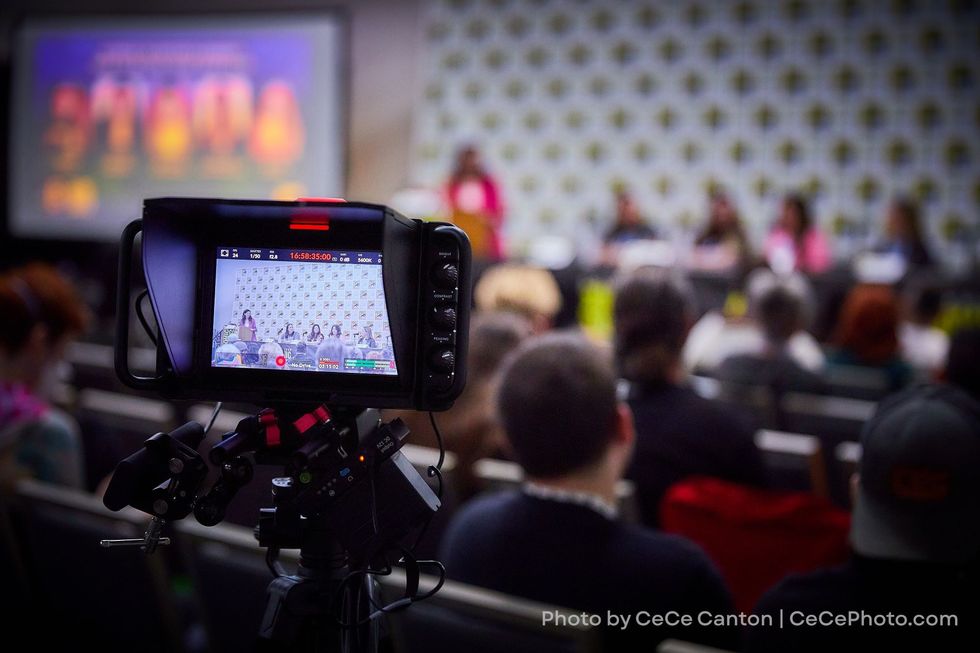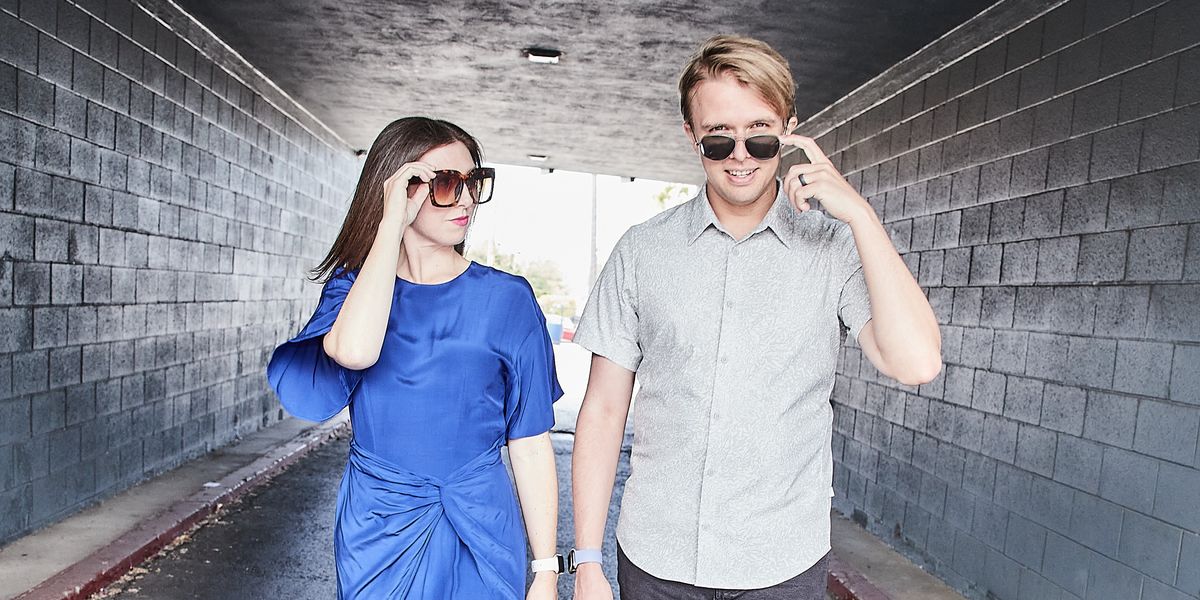These Indie Filmmakers Explain Why They're Blackmagic Converts
We speak with Danielle Beckmann and Timothy Reese about creativity, Blackmagic tools, and more.

Behind-the-scenes on 'Sam & Kiki'
Danielle Beckmann and Timothy Reese are members of a creative collective called Brooklyn Quarter that has been putting out content for years. They have appeared at SDCC panels, livestreamed their popular Dungeons & Dragons games, and branched into independent filmmaking.
Beckmann, an actor and producer, just premiered a horror feature called Sam & Kiki that is currently making the festival rounds. Reese, a producer, cinematographer, and editor, helps run the multicam broadcasts of their tabletop games (while also acting as DM).
They have recently transitioned into the Blackmagic ecosystem, using cinema cameras and the ATEM switchers for capture and DaVinci Resolve for post. We hopped on Zoom to talk to the pair about their creative process, why they made this switch, and advice for putting together a creative team.
Editor's note: this conversation has been edited for length and clarity.
No Film School: What can you tell us about Brooklyn Quarter?
Danielle Beckmann: Brooklyn Quarter was started in Brooklyn, New York, in 2017. We were mainly just a group of friends wanting to create things and actually keep friendships alive was actually how it started.
Timothy Reese: We started Brooklyn Quarter because it's often the case when you have creative friends but no outlet that it's pretty easy to get scattered. Because you all start working on individual projects and then the next thing you know, it's been several months and you haven't seen your friends in a while. So we wanted to start Brooklyn Quarter as a place where we could take the projects we were working on, and they would have somewhere to land afterward.
At the time, Danielle was working on some sketch comedy ideas that ended up turning into a short series she did called Just All Around Good Ideas. That was like, bad advice from a "Dear Abby" [character].
Beckmann: They're not good ideas, surprise. Spoiler alert.
Reese: And we also were doing a weekly livestreamed tabletop show. We did about 130 episodes of that show. I was the Dungeon Master of that show. And then Danielle had another show that we were doing contemporaneously.
Those three concepts were the main drivers for why we started. And it was great because it galvanized what we were ... I don't think before we were doing these channels that I was even thinking about filmmaking in general as something that I wanted to do as a career. I just kind of landed in it.
Beckmann: Yeah. I come from a theater background, so I got my BFA in theater from Chapman. I have been performing on stage since I was three years old, and I've always been performing and producing in some capacity. ... So I've always had that kind of producorial thing, but more so in the film world. And so when Timothy and I met—we met the end of 2015, early 2016—oh, I should say we're married.
Reese: Oh yeah, we're married.
NFS: Congratulations!

Beckmann: Thank you. But I, at that point, when we met, I had not made a film yet. And so then us wanting to keep our friends who were musicians, actors, dancers, being like, "Well, wait, why don't we all come together?"
What's a long-form way of storytelling? Dungeons & Dragons. You never have to end. Even if your character dies, you can build a new one. So that was the beginning of us gathering things together. And it was so helpful for me to finally have an outlet and a name for the community that I was building. Because I used to be a coach as well. And so I guess I still do coaching. Coaching artists, actors, and even fashion designers, coaching people on where they want to go and what they want to see creatively.
I think it was the first time where it was like, "Oh, I can put everything under an umbrella now." There's a place to land. Even though we've moved to LA, we're still Brooklyn Quarter.
NFS: As we are in horror week now, what do you like about working in horror?
Beckmann: I will say that I always had an aversion to horror until I started making films. So I made my first film in 2019. It was called Liza Anonymous, and it premiered at the 2021 Tribeca Film Festival. After making that and then seeing how horror is such a gateway to this different kind of storytelling, which is the same thing. Like, what does this person want and why?
But when it comes to the genre, I feel like especially as a beginning filmmaker, there can be so many different places. It can be a little more forgiving when it comes to comedy, a lower budget. You can tackle bigger conversations with horror as well. I've really, really been dipping my toes in and digging into it. And I got cast in my first horror film shot in 2021 called Sam & Kiki, and it's premiering at Screamfest in LA in a week and a half. I cannot wait because normal Danielle, old Danielle would be like, "I'm just going to go watch my film and then leave." But I'm like, no, I'm going to stay. I'm going to watch some movies. I'm going to get into it.
For me, I would say I really personally love the psychological thrillers. I love Get Out. I also love old school like The Birds, by Alfred Hitchcock. That kind of thing really inspires me versus the scary clown ones. I can't even go near those. But I still understand and I don't write off the filmmakers like I used to. It is so interesting that that empathy came through my own journey.
Reese: I know we were just briefly chatting about D&D, I would make the argument that D&D is comedy horror as a genre, as a genre of storytelling. Because if you're a Dungeon Master, that's what you're writing. These are not pleasant encounters that people are encountering. But a lot of times it's comedy because that's how you make it light.
With the shows that we've always done, and even with our current show Novel Chronicles, it's absolutely comedy horror. For me, that's the genre that I love. I think the first horror movie I ever saw was when my brother sat me down as a child to watch Evil Dead 3, Army of Darkness. And that was my introduction to horror. He was like, "Hey, you got to watch this. It's very funny. It has knights." And that's kind of still the stories that I'm telling.
NFS: It does bleed into so many other different genres. And that's why I also love it is it can be funny, it can be fantasy, it can be sci-fi, it can be all those things. It can still be horror.
Beckmann: Yeah. There's also, like with Handmaid's Tale, I feel like it's that dystopian thing. And I think that companies like A24 are doing it so well with this new wave of, "What is it? What does it look like?"
NFS: I'd love to ask about challenges on projects and how they were overcome.
Beckmann: On Sam & Kiki, I play Sam. I play the character of Sam, but I also, I'm an associate producer. So I wasn't in, in the very beginning. I'm not an executive producer. They brought me on more after post.
And that team had a film at the Tribeca Film Festival in the same block as my short film, Liza Anonymous. They saw the different characters I was playing in Liza Anonymous, and they reached out to their casting director and they're like, "We need to have Danielle Beckmann on this project." And that was just so cool for me to immediately get to go shoot something else at the end of 2021 when we're like ... We had just gotten the vaccine. There was a lot going on. And so it was really encouraging to get to immediately act in something again.
But when I first got the email from the casting person, it said, "This is filming in Connecticut." Well, I live in LA. "This is a non-union film." Well, I'm SAG. All these things. I'm like, "Guys, I can't do it." I literally ... I never do this. I deleted the email. I didn't even respond, which is so weird. I was like, "Not for me." Because when I see an opportunity, I usually always seize it.
So anyway, I did, and then a few days later it was like, "Hey again, Danielle, did you get this?" And I was like, OK, maybe I'll take a look at this. And through that, I really learned, because I didn't have an agent at the time, I learned to advocate for myself. And I said, "Hey guys, I'm a SAG actor. This will have to be a SAG production if you bring me on. And I don't need this crazy day rate. I just need to make sure that this is above board."
Well, here we are in the strike, and I've been producing shorts that are completely under all the SAG agreements. But I'm just so grateful that I did that because they changed the production and they paid to fly me out. And they just listened and knew exactly what they wanted. It's funny because I could have looked at it as a complete challenge, but I just said, "OK, this is how I'm going to interact with this." I think that when it comes to things that we do with Brooklyn Quarter, and this is something actually Timothy has really taught me in practice is, doing the right thing is usually the harder thing.
Because I could have lost that part and then been sad, but it really worked out. It was meant for me. And this happens for us when it comes to, I don't know, everything from double-checking contracts, and we don't like to do volunteers with Brooklyn Quarter. We like to give everyone food and gas money. We want to create a space that follows through, I think. And we don't sweep things under the rug. ...
When it comes to fundraising for our projects. It's really neat the place we're at now because we have independent creators come to us and say, "Can you help us make this?" And it's helpful to be like, "Great. So where's the money coming from? Is this crowdfunded? Is this personally financed?" Because we will not go into a project where we know we have to do 12-hour days. We want to do 10-hour days for our crews.
Reese: Yeah, tops.

Beckmann: And that's why a budget is so important because you go, "Well, sure, we could film this in two days, but let's make it three." Or, "Sure, this script is only 15 pages. We could film it in three, let's do it in four." So that we might've spent a little bit more money. And we've learned that on past shorts and things. And it's so helpful to learn that on shorts because when it comes to a feature, you really know how it works.
Reese: One of the things that, so we came in, I came in sideways. My background was in journalism, and then I was working a lot in corporate industries and that kind of post-production process. I didn't experience entering the industry after college, independent filmmaker path, where a lot of times it's very hardscrabble and it's a lot of projects that you're picking up because you need to pay rent. I never experienced that.
So I came in really with a singular project I wanted to make and then was figuring out ways to finance that to make it. But coming in a little bit like, I don't know, I had more years that I had experienced working in jobs and stuff before I had to do that really hard scrabble.
One of the things that's been really, I think, a challenge when we first started making films and something that we've really taken as a lesson is that there really is this collective process of goodwill. There's this collective process of making the correct decisions and making the harder decisions and making the more difficult, sometimes costlier, sometimes way less convenient, the more above board. We really fight to make sure that everything we do is above board and the right decision by everyone involved. And it's paid dividends way beyond anything we've expected.
Where it's like that, instead of just looking at it as going every person we ever interact with is a kind of permanent partner in the film industry for us. Has made it so that we have a holiday party that we started whenever we came out here three years ago, that the first one, it was everyone we had worked with in a year, and we had 40 people there. It was awesome. It was really fun. And then the next year we had 80 people there. And we had all these giveaways and all these people that came then were able to network with other filmmakers.
It was amazing to go like, "Oh my gosh, we made this." We were part of this community that got made. And now we're going into our third year, and we have people messaging us in August asking whenever it is this year because they're trying to schedule their holiday around it. And something about that is, like, we didn't have to fake that.
We don't have to convince people to come to it. It really is that paid dividend of kindness of hard work. But also treating people fairly and like ruthlessly, treating people fairly.
Beckmann: And within that, who people might meet their next collaborator at one of our events. And knowing that there's going to be some really fantastic people that you'll meet there. I will say our holiday party is a spooky yuletide thing. It's called Fullernight, and it's one word, Fullernight. It is a holiday that takes place in the world of Ben-Tir, which is our world, our Dungeons & Dragons world that we play in Novel Chronicles.
It is 36 hours of darkness on this night. So all sorts of creatures come out and prowl. You don't want to be outside. So you're supposed to spend all of Fullernight with friends, with family, by the fire, and being cozy, and people stock up for it. And there's stories and there's cider and all the things. And so Timothy from his brain had created this, and then we put it into a party, and now people look forward to it.

NFS: I do want to talk tools, so we can talk cameras. What do you like to work with?
Reese: We use eight cameras at the moment on the tabletop show, which is arguably too many cameras. This is always the thing, anytime you see any kind of tabletop series, the amount of effort that goes into them is just astronomical. And it's typically a hidden effort, it's silent because no one knows.
But yeah, so we're using eight cameras at the moment. ... So we started off with really cheap Canon camcorders back in Brooklyn. But most recently we've been using a lot of Panasonics, just regular mirrorless cameras. And we're very, very happy because Blackmagic just sent us a bunch of the 6K studio cameras, 6K Studio Pros.
One of the big issues we've had historically is that for things we film in the studio, there's this hidden struggle that a lot of independent, especially YouTubers encounter, where the amount of footage that you generate is enormous, and where do you store it? And you have all these projects where you have multiple cameras, now you're syncing them up. Now you're doing a multicam project. And if you're doing multiple microphones, now you're juggling all these assets ... And especially if you're on a lot of different systems where you're using a lot of different cameras with a lot of different color profiles, it just becomes a thing.
So we're in the middle of switching to Blackmagic stuff, which has been really helpful for us. Legitimately. We've been editing on Premiere. I've been on Premiere since like 2011 independently. And everything we've produced for Brooklyn Quarter has been Premiere up until about six months ago when we switched to Resolve. And especially with going into the Blackmagic stuff. We have ATEM switchers now, and because of that, it's a lot easier. So that's what we've been shooting on.
And then we just recently, we just shot a micro-short, which is called Pooped. Which is a really cute little micro-short that it was really a super independent production. There were five of us on set in the crew and two actors. And it was something that was really fun. We wanted to film at the beginning of the strike because there were a lot of people that were like, "Well, we don't have anything to do, let's make something creative." And Danielle worked with the script with, what was the author, the writer's name on the script?
Beckmann: So it was actually written, her name was Paulina Alvarez. She wrote this script for just a class exercise with our friend Maggie Hood, who acted in it. And then Maggie came to us and just said, "Hey, can you adapt this to be from a theater scene into something on camera?" And so I got my blessing from Paulina, and she's like, "Sure, just go." Yeah, it's a five-minute meet-cute short. And we shot it on the URSA.
Reese: Yeah. Blackmagic sent us a URSA, a 12K, which we shot on, which was pretty fun.
Beckmann: And that was Timothy's first pancake on the URSA if you will. So that's in post right now. We're editing that.
Reese: It is funny the difference between where we started. We started on a camcorder that was about the size of the viewfinder back in 2017. This was our camera, and now we're on this.
Beckmann: Yeah, it's really cool. And we're going to also be shooting a new horror short that I wrote. And this will be, we're going to be using the URSA for that as well, unless Timothy, are we going to use the ...?
Reese: I don't know. We're waiting to see if we get a full frame.
Beckmann: We're waiting to see.
Reese: It's a low-light film.
Beckmann: It's going to be Blackmagic.
Reese: We've become converts.
Beckmann: Yes.
Reese: It just smoothed out a lot of stuff. On other projects, on other film sets that's what we've been working on recently.
Beckmann: The horror short that I'm writing, directing, and will be in, is called Día de la María. And it is about this group of friends who every year on Halloween, they stage an intervention with their best friend who died in her Día de Muertos costume. And they revive her and have a conversation every year to try to get her to do something. Working on the logline.
However, it's going to be really fun, it's definitely going to be a horror comedy. But it's going to be my first time really playing with those practical effects and makeup and diving into a little bit of the grotesque, which is not normally my style, but I just want to lean into it.
Reese: We work with a lot of other creators in LA who are shooting on everything from, the most recent projects we were working on were an ALEXA Mini and ALEXA Amira. And then what was the one before that? I think it was two Amiras. Yeah, it's been two Amiras and ALEXA Mini.
Beckmann: It's a lot of ALEXA stuff. Or ARRI stuff.
Reese: I mean, it's something I really enjoy about short films is that you encounter a lot of creators and you encounter a lot of different equipment. And the different ways that people approach practically the cinematic art. And going like, "I want to film this. There are 25 different avenues to approach to get there. Which one am I going to take at the moment?"
And it's been really fun to see, especially when you get on set and you're like, "Hey, that's a camera package that's like $20,000 camera package." And you see another one and you're like, "That's $160,000 on that table. Oh my goodness. Wow, that's a Mercedes Sprinter van fully loaded on that table."

NFS: What advice would you give to someone wanting to shoot a horror short?
Reese: Something that we've taken as a practice, just in the general things we make, and I think it really applies to horror in ... I think it's why so many new filmmakers start with horror, is that A) there's a massive built-in audience. And so because of that, you have people that they're going to want a horror film regardless of how polished you can make it.
So it's a genre that's so forgiving for someone starting out because if the story's good, it doesn't matter so much that maybe the techniques you're using aren't to the level that your taste is. Like that famous Ira Glass thing about the difference between your taste and how well you can execute it. And that's the struggle of every creator.
And so that's something that if you have a good story and you have the people that you can make that story with, and you can make it well and in a fun way and on a set that is really encouraging for others to just be a part of, you can get by with a lot lower budget. And you're still going to have an audience that is going to want to see it. And you're still going to have ... It'll still get compared to titans within the horror genre because that genre is really forgiving in that sense. And that's something I actually genuinely love about it. It's a lot easier to get into it.
Beckmann: I would say kind of brass tacks, if someone is looking to dip their toe in and write something ... Oh, God, my answer's so general. Don't be afraid to go there.
This is something that I think is so important for writers, especially writing shorts. The first few drafts, go all the way, go high budget, get it out. If it's 10 pages of special effects and VFX and all this stuff, go all the way. Then when it comes time to actually, oh, we're going to put what's on the page on screen, then it's like, you know what? We have to cut this location. We have to do this thing. We have to, whatever.
But don't write from a place of censoring. Yeah, just go all the way, because with Día de la María, it happens to take place in one house. But that's because that's where I see these characters and this moment. And so lucky me, I only have one location, but that's not where I started from.


 "'Back Home"via Mercedes Arutro
"'Back Home"via Mercedes Arutro 'Back Home'via Mercedes Arutro
'Back Home'via Mercedes Arutro 









